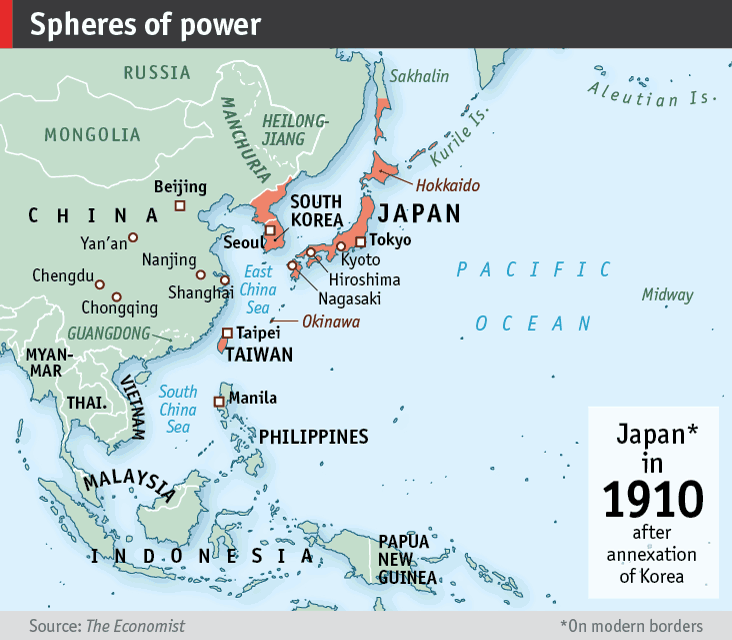The Economist published an essay this week titled "The Unquiet Past". It suggests that Shinzo Abe, Japan's Prime Minister, is seeking to change the perception of electorate of the World War II history of their country. Speaking of the "Greater Asia Co-Prosperity Sphere" concept advanced by his country in World War II:
Mr Abe believes that Japan’s pursuit of fukoku kyohei was essentially right then and still is today, and that its resumption is the key to making Japan what some would call a “normal” nation again. It is what Mr Abe chooses to call “the post-war” which is the shameful historical exception, with its reliance on American tutelage and a constitution that clips Japan’s wings abroad.The article begins describing the Yasukuni Shrine that commemorates 2,466,532 Japanese who died in wars following the Meiji Restoration. They are termed imperial protectors, their names inscribed in the "Book of Souls".
But in 1978 the priests of Yasukuni surreptitiously enshrined 14 political and military leaders, including General Hideki Tojo, the wartime prime minister, who had been found guilty by the Tokyo War Crimes Trial of planning or prosecuting the military aggression of the 1930s and 1940s. All 14 had either been executed by Japan’s new American overlords or died in prison.Emperors Hirohito and Akihito thereafter stopped attending ceremonies at the shrine as did other national leaders. Shinzo Abe, however, does attend the festivals there honoring the Japanese leaders executed for war crimes as well as other persons more appropriate for his salute.
The article also notes that it was Chiang Kai-shek, and his Kuomintang (KMT) that led the Chinese resistance to the Japanese invasion of China, while the Communists were less involved in that resistance, secure in their redoubts in the interior. After the Communist victory over the KMT, the official history of the war tended to ignore the sacrifices of Chiang and the KMT. Now, however, people in regions of China that bore the heavy brunt of the Japanese attack and that tied up Japan's military (so that it could not be used in other theaters) are beginning to claim credit for their regions' sacrifices and successes.
Of course, the revision of official history is not new. Recently in the news some have sought to remind the German speaking people of the debt that they owe to other Europeans for the Holocaust and German/Austrian aggression in two World Wars. In the United States, as Confederate flags continue to be flown in the South, many seek to remind those venerating the Stars and Bars that the Confederacy was founded on the principal that African-Americans were inferior to European Americans and that it sought to make the institution of chattel slavery permanent in the Confederacy; indeed, hundreds of thousands of lives were lost in a war in which those who fought under the Stars and Bars were doing so to keep other people enslaved.
History Should Be Based on Evidence, Not Emotion
Of course, Historians have changed the dominant interpretation of past epochs. However, professional historians are continuing to mine original sources, publishing their findings in peer reviewed journals and well sourced books. The body of evidence -- including factual evidence -- on many historical epochs continues to increase in volume and improve in quality.
I expect that historians will have increasing difficulty challenging existing paradigms without adducing new and important evidence to support novel assertions.
When politicians and government officials offer new views of history, they should be tested against the prevailing historical ideas and especially against the evidence. Substitution of ideology for knowledge is not a good way to make successful policies.
Of course, policy makers views should be based more widely on knowledge. It appears that both the Japanese and Chinese governments have gotten their economics wrong in the recent past. Economists too are building impressive edifices of factual evidence, and are increasingly defending their ideas with such evidence.
One hopes the two governments are drawing on expert sociological knowledge, the Chinese to project the implications of the one child policy that their country followed, and the Japanese to project the implications of an aging population increasingly supported by a smaller workforce. Again, sociologists are strengthening their field by gathering and organizing factual evidence, and supporting theses with evidence.
When I think of the region of the world from Syria to Pakistan, I can only wonder at its complexity and at the willingness of Americans to intervene in the region with very little understanding of the history, culture or religion of the region. The willingness to intervene seems to continue as does much of the ignorance. Of course, there are many in America who have lifetimes of experience in these countries, having immigrated from them; unfortunately, those sometimes most willing to speak from such knowledge to power only do so to advance their own interests.

No comments:
Post a Comment